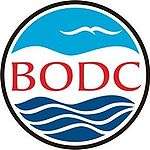British Oceanographic Data Centre
 | |
| Formation | 1969 |
|---|---|
| Location | |
Head of BODC | Dr Graham Allen |
Parent organization | Natural Environment Research Council (NERC) |
Staff | approx. 500 |
| Website |
www |
The British Oceanographic Data Centre (BODC) is a national facility for looking after and distributing data about the marine environment. BODC is the designated marine science data centre for the UK and part of the Natural Environment Research Council (NERC). The centre provides a resource for science, education and industry, as well as the general public. BODC is hosted by the National Oceanography Centre (NOC) — primarily at its facility in Liverpool, with small number of its staff in Southampton.


History
The origins of BODC go back to 1969 when NERC created the British Oceanographic Data Service (BODS). Located at the National Institute of Oceanography, Wormley in Surrey, its purpose was to:
- Act as the UK's National Oceanographic Data Centre
- Participate in the international exchange of data as part of the Intergovernmental Oceanographic Commission (IOC) network of national data centres
In 1975 BODS was transferred to Bidston Observatory on the Wirral, near Liverpool, as part of the newly formed Institute of Oceanographic Sciences. The following year BODS became the Marine Information and Advisory Service (MIAS). Its primary activity was to manage the data collected from weather ships, oil rigs and data buoys. The data banking component of MIAS was restructured to form BODC in April 1989. Its mission was to 'operate as a world-class data centre in support of UK marine science'. BODC pioneered a start to finish approach to marine data management. This involved:
- Assisting in the collection of data at sea
- Quality control of data
- Assembling the data for use by the scientists
- The publication of data sets on CD-ROM
In December 2004, BODC moved to the purpose-built Joseph Proudman Building on the campus of the University of Liverpool. A small number of its staff are based in the National Oceanography Centre (NOC), Southampton.
Aims
- Work alongside scientists during marine research projects
- Provide quality control and archiving of oceanographic data
- Maintain an online source of information and improve public access to marine data
- Provide innovative marine data products
National role

BODC is one of six designated data centres that manage NERC's environmental data and has a number of national roles and responsibilities:
- Performing data management for NERC-funded marine projects
- Maintaining and developing its archive of marine data, the National Oceanographic Database (NODB)
- Managing, checking and archiving data from tide gauges around the UK coast for the National Tide Gauge Network, which aims to obtain high quality tidal information and to provide warning of possible flooding of coastal areas around the British Isles. This is part of the National Tidal & Sea Level Facility (NTSLF)
- Hosting the Marine Environmental Data and Information Network (MEDIN)
- Working in partnership with other NERC marine research centres:
- British Antarctic Survey (BAS)
- National Oceanography Centre (NOC), Liverpool, formerly Proudman Oceanographic Laboratory (POL)
- National Oceanography Centre (NOC), Southampton
- Plymouth Marine Laboratory (PML)
- Scottish Association for Marine Science (SAMS)
- Sea Mammal Research Unit (SMRU)
International role
BODC's international roles and responsibilities include:
- Contributing to the International Council for the Exploration of the Sea (ICES) Marine Data Management
- Creating, maintaining and publishing the General Bathymetric Chart of the Oceans (GEBCO) Digital Atlas
- BODC is one of over 60 national oceanographic data centres that form part of the IOC International Oceanographic Data and Information Exchange (IODE)
Projects and initiatives
The following are a selection of the projects that BODC is or has been involved with:
- Servicing of a RAPID mooring.
- Atlantic Meridional Transect (AMT)
- The AMT programme undertook a twice yearly transect between the UK and the Falkland Islands to study the factors determining the ecological and biogeochemical variability in the planktonic ecosystems.
- Autosub Under Ice (AUI)
- The AUI programme investigated the role of sub-ice shelf processes in the climate system. The marine environment beneath floating ice shelves was explored using Autosub, an AUV.
- Marine Productivity (MarProd)
- MarProd helped to develop coupled models and observation systems for the pelagic ecosystem, with emphasis on the physical factors affecting zooplankton dynamics.
- Rapid Climate Change (RAPID)
- The RAPID programme aimed to improve understanding of the causes of sudden changes in the Earth's climate.
- Ocean Margin Exchange (OMEX)
- The OMEX project studied, measured and modelled the physical, chemical and biological processes and fluxes at the ocean margin - the interface between the open Atlantic ocean and the European continental shelf.
- SeaDataNet
- SeaDataNet aims to develop a standardised, distributed system providing transparent access to marine data sets and data products from countries in and around Europe.
- System of Industry Metocean data for the Offshore and Research Communities (SIMORC)
- SIMORC aimed to create a central index and database of metocean data sets collected globally by the oil and gas industry.
- Vocabulary Server
- BODC operates the NERC Vocabulary Server Web Service , which provides access to controlled vocabularies of relevance to the scientific community.
External links
- BODC homepage
- BODC News and events
- Natural Environment Research Council (NERC) homepage
- NERC Data centres
- NERC Data Discovery Service
- National Tidal and Sea Level Facility (NTSLF)
Coordinates: 53°24′27.5″N 2°58′8.2″W / 53.407639°N 2.968944°W